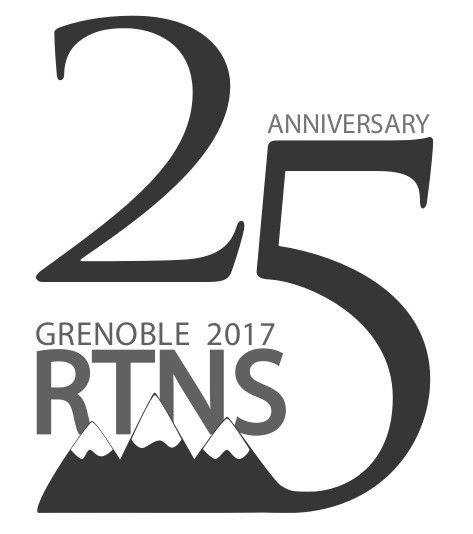
|
International Conference on Real-Time Networks and Systems |
Grenoble, France, October 4-6, 2017
RTNS is a friendly conference with a great sense of community that presents excellent opportunities for collaboration.
The purpose of the conference is to share ideas, experiences and information among academic researchers, developers and service providers in the field of real-time systems and networks.
RTNS 2017 will be in Grenoble, France.
RTNS 2017 is the 25th edition of the conference formerly known as RTS (Real-Time Systems, Paris). The first 12 editions of RTS were french-speaking events held in Paris in conjunction with the RTS Embedded System exhibition. Since its 13th edition, the conference language of RTNS has been english.
The proceedings are published by the ACM ICPS and indexed by Scopus.
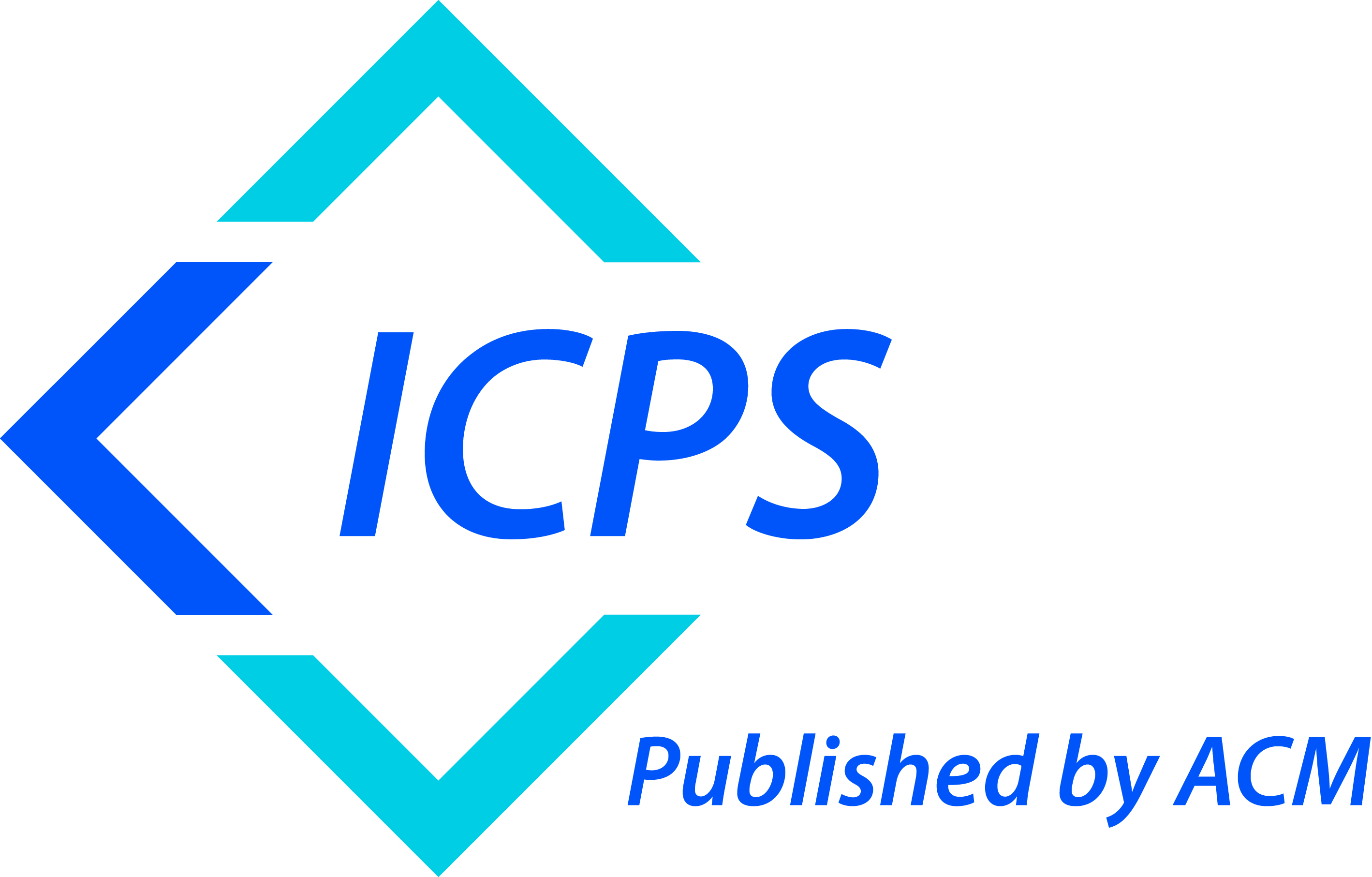
Highlights
- A selection of the best papers will be identified as outstanding papers; the authors of these papers will be invited to submit extended versions to a special issue of the Springer Real-Time Systems journal.
- Prizes will be awarded for best paper, best student paper, and best presentation.
News
- Dec. 21, 2017 : Proceedings of Junior Workshop added
- Oct. 10, 2017 : Awards and 25th anniversary Awards added
- Oct. 6, 2017 : 25th anniversary quiz added
- Oct. 1st, 2017 : Details on gala dinner added (see here)
- Sept. 27, 2017 : Accepted papers and program pages updated with artifact evaluation
- Sept. 11, 2017 : Artifact evaluation page updated
- Sept. 9, 2017 : Program added (see here)
- Sept. 5, 2017 : Early registration deadline extended (see here)
- Sept. 5, 2017 : List of accepted papers added (see here)
- August 31, 2017 : Junior workshop deadline extended (see here)
- July 18, 2017 : Registration is open (see Registration)
- July 17, 2017 : submission deadline updated to July 17, 2017, 23:59:59, anywhere on Earth (see Important Dates)
Contact
rtns17@univ-grenoble-alpes.frAwards
RTNS17 and JRWRTC17 Awards
Best Paper Award: José Fonseca, Geoffrey Nelissen and Vincent Nélis. Improved Response Time Analysis of Sporadic DAG Tasks for Global FP Scheduling
Best Student Paper Award: Catherine Nemitz, Tanya Amert and Jim Anderson. Real-Time Multiprocessor Locks with Nesting: Optimizing the Common Case
Best Presentation Award: Behnaz Pourmohseni. Predictable Run-Time Mapping Reconfiguration for Real-Time Applications on Many-Core Systems
Best Paper Award in the Junior Workshop: Khaoula Boukir, Jean-Luc Béchennec, and Anne-Marie Déplanche. Reducing the Gap between Theory and Practice: Towards a Proven Implementation of Global EDF in Trampoline
25th Anniversary Awards
25th Anniversary Awards
Most Influential Paper Award: Nathan Fisher and Sanjoy Baruah. A Polynomial-Time Approximation Scheme for Feasibility Analysis in Static-Priority Systems with Bounded Relative Deadlines. In RTNS 2005, Paris
Influential Paper Award: Robert I. Davis, Sanjoy Baruah, Thomas Rothvoss, and Alan Burns. Quantifying the Sub-optimality of Uniprocessor Fixed Priority Preemptive Scheduling for Sporadic Tasksets with Arbitrary Deadlines. In RTNS 2009, Paris
Influential Paper Award: Joël Goossens and Christophe Macq. Limitations of the Hyper-Period in Real-Time Periodic Task Set Generation. In RTS 2001
Influential Paper Award: Frédéric Ridouard and Pascal Richard. Worst-Case Analysis of Feasibility Tests for Self-Suspending Tasks. In RTNS 2006
Conference Program
Wednesday October 4th |
|
|
8:30 |
Registration |
|
9:20 - 9:40 |
Opening
Remarks |
9:40 - 10:30
|
Session 1 - Networks I |
|
Session chair: Jean-Luc Scharbarg Eike Schweissguth, Peter Danielis, Dirk Timmermann, Helge Parzyjegla and Gero Muehl ILP-based Joint Routing and Scheduling for Time-Triggered Networks Dorin Maxim and Ye-Qiong Song 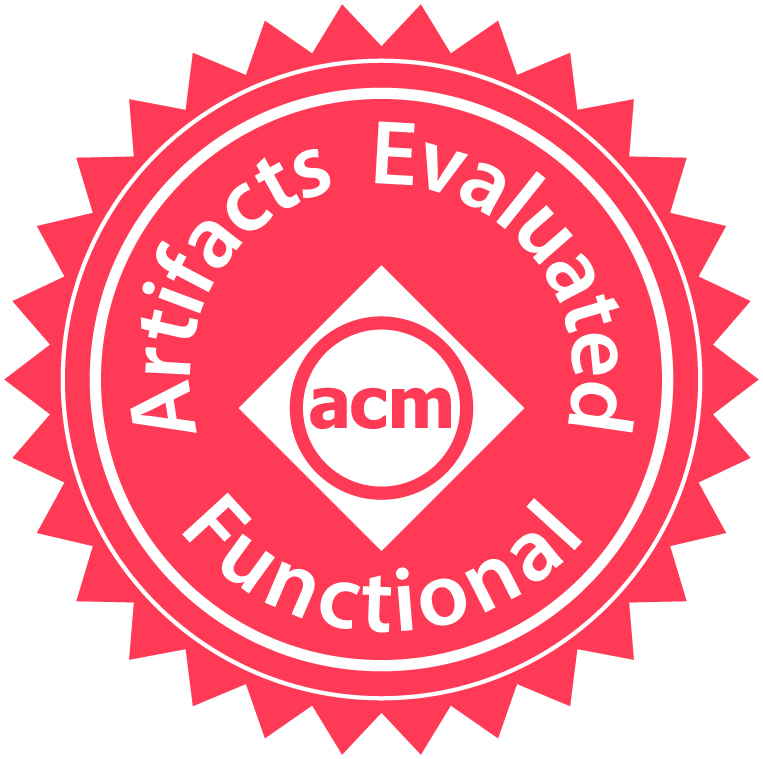 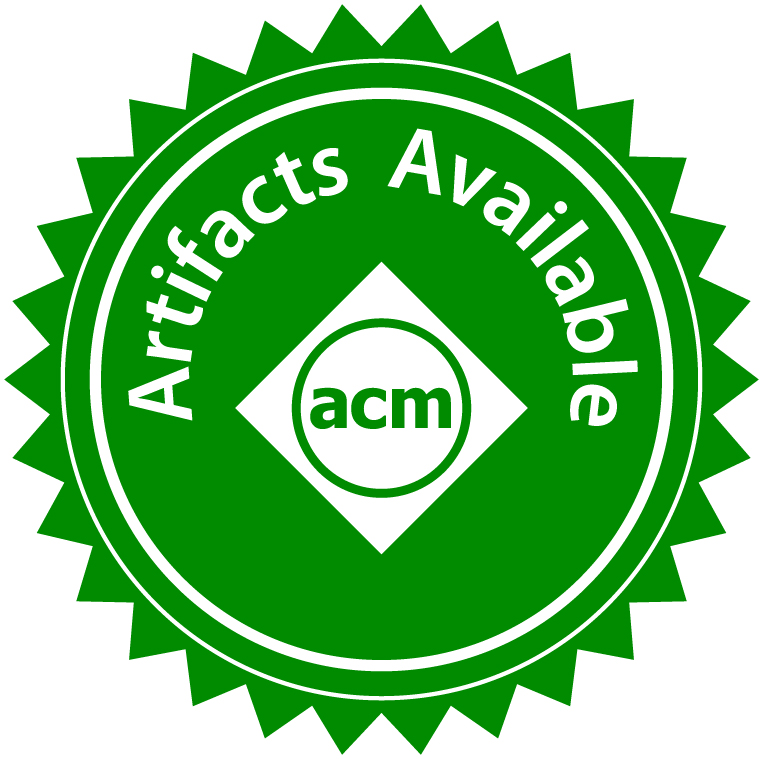 artifact artifactDelay Analysis of AVB trafic in Time-Sensitive Networks (TSN) |
|
|
10:30 - 11:00 |
Coffee break |
11:00 - 12:40
|
Session 2 - Multicore: constraints and resource sharing |
|
Session chair: Luca Abeni José Fonseca, Geoffrey Nelissen and Vincent Nélis Improved Response Time Analysis of Sporadic DAG Tasks for Global FP Scheduling (OUTSTANDING PAPER) Catherine Nemitz, Tanya Amert and Jim Anderson Real-Time Multiprocessor Locks with Nesting: Optimizing the Common Case (OUTSTANDING PAPER) Nicola Capodieci, Roberto Cavicchioli, Paolo Valente and Marko Bertogna SiGAMMA: Server based integrated GPU Arbitration Mechanism for Memory Accesses Micaiah Chisholm, Namhoon Kim, Stephen Tang, Nathan Otterness, James Anderson, F. Donelson Smith and Donald Porter Supporting Mode Changes while Providing Hardware Isolation in Mixed-Criticality Multicore Systems |
|
|
12:40
- 14:00 |
Lunch |
14:00 - 15:15
|
Session 3 - Single processor scheduling |
|
Session chair: Dorin Maxim Daniel Casini, Luca Abeni, Alessandro Biondi, Tommaso Cucinotta and Giorgio Buttazzo 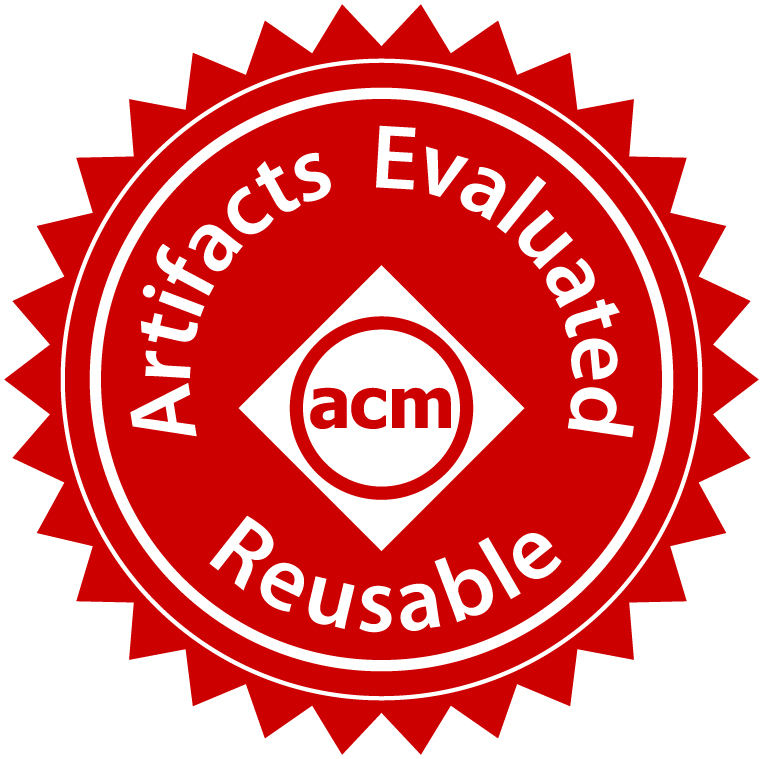  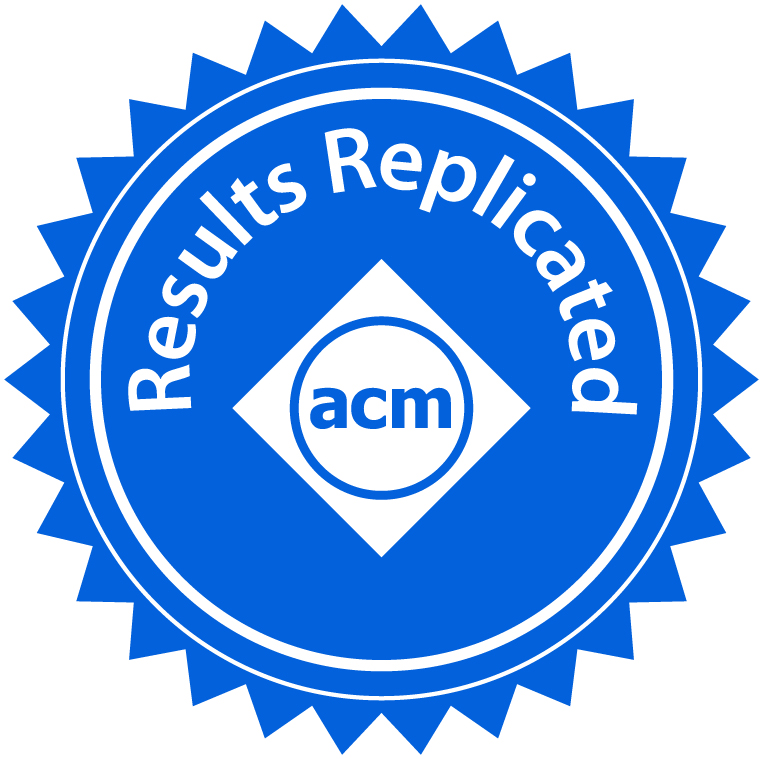 artifact artifactConstant Bandwidth Servers with Constrained Deadlines Sanjoy Baruah, Vincenzo Bonifaci, Alberto Marchetti-Spaccamela and Victor Verdugo A scheduling model inspired by control theory Leonie Ahrendts, Sophie Quinton and Rolf Ernst    artifact artifactFinite Ready Queues As a Mean for Overload Reduction in Weakly-Hard Real-Time Systems |
|
|
15:15
- 15:45 |
Coffee break |
15:45 - 17:00
|
Session 4 - Automotive |
|
Session chair: Ye-Qiong Song |
|
17:00 - 18:00
|
Junior Workshop |
|
18:00
- 20:00 |
Welcome
cocktail and posters
|
Thursday October 5th |
|
8:30 - 09:20
|
Session 5 - Multicore: global vs. partitioned |
|
Session chair: Joel Goossens |
|
09:20 - 10:30
|
Keynote Talk |
|
10:30 - 11:00 |
Coffee
Break |
11:00 - 12:40
|
Session 6 - Design practices |
|
Session chair: Emmanuel Grolleau Behnaz Pourmohseni, Stefan Wildermann, Michael Glaß and Jürgen Teich Predictable Run-Time Mapping Reconfiguration for Real-Time Applications on Many-Core Systems (OUTSTANDING PAPER) Alexandre Honorat, Hai Nam Tran, Loïc Besnard, Thierry Gautier, Jean-Pierre Talpin and Adnan Bouakaz    artifact artifactIntroducing ADFG: a scheduling synthesis tool for dataflow graphs in real-time systems Guillaume Brau, Nicolas Navet and Jérôme Hugues Heterogeneous models and analyses in the design of real-time embedded systems - an avionic case study Anh Toan Bui Long, Yassine Ouhammou, Emmanuel Grolleau, Loïc Fejoz and Laurent Rioux Bridging the gap between practical cases and temporal performance analysis: a models repository-based approach |
|
|
12:40
- 14:00 |
Lunch |
14:00 - 15:15
|
Session 7 - Timing analysis |
|
Session chair: Claire Maiza |
|
|
15:15
- 15:45 |
Coffee
Break |
|
15:45
|
City
Tour and Banquet Departure |
Friday October 6th |
|
9:15 - 10:30
|
Session 8 - Mixed Criticality |
|
Session chair: Zhishan Guo |
|
|
10:30
- 11:00 |
Coffee
Break |
11:00 - 12:40
|
Session 9 - Networks II |
|
Session chair: Sophie Quinton |
|
|
12:40
- 14:00 |
Lunch |
14:00 - 15:15
|
Session 10 - Scheduling |
|
Session chair: Rob Davis |
|
15:15 - 15:30
|
Closing remarks
|
Conference aims and topics
PDF version of the Call for PapersRTNS is a friendly and inclusive conference with a great sense of community that presents excellent opportunities for collaboration. Original unpublished papers on all aspects of real-time systems and networks are welcome. RTNS covers a wide-spectrum of topics in real-time and embedded systems, including, but not limited to:
- Applications: automotive, avionics, space, railways, telecommunications, process control, multimedia, cyber-physical systems.
- Software technologies for real-time systems: compilers, programming languages, middleware, RTOS, hypervisors, real-time databases.
- Real-time system design and analysis: models of real-time tasks, task/message scheduling, evaluation, mixed-criticality systems, model-driven development, WCET estimation, distributed systems, quality of service, security, co-design.
- Formal specification and verification: application of formal models, such as model checking, SMT or constraint programming, to solve real-time problems
- Real-time distributed systems: fault tolerance, time synchronization, task/messages allocation
- Networks: network/real-time calculus, wired and wireless communication networks, fieldbuses, networked control systems, sensor networks, NoC
- Hardware support for real-time systems: power/temperature-aware techniques, heterogeneous multi-core platform, HW accelerators.
The 11th Junior Researcher Workshop on Real-Time Computing is organized jointly with RTNS.
Instructions to authors
Submissions are limited to 10 two-column pages and must adhere to the ACM format. For convenience, we provide below the templates:
The proceedings are published by the ACM ICPS and indexed by Scopus.
A selection of the best papers will be identified as outstanding papers; the authors of these papers will be invited to submit extended versions to a special issue of the Springer Real-Time Systems journal. RTNS will have the artifact evaluation for the accepted papers, to guarantee the availability of source code and data to replicate the experiments.
Authors submitting a paper to RTNS confirm that neither the paper, nor a version of it, is under submission elsewhere nor will be submitted elsewhere before notification by RTNS, and that if the paper is accepted, at least one author will register by the special registration deadline, and present the paper at the conference.
The link to the Easychair submission page is hereArtifact Evaluation
We give the opportunity to authors of papers accepted to the conference to submit an artifact establishing the reproducibility of the computational results described in their paper.The objective of Artifact Evaluation (AE) is to reward efforts made by researchers to allow others to replicate their experiments. The AE enables to reproduce results, which helps researchers to build on top of each other's work and to compare results in a fair manner. The AE reviewers do not evaluate the correctness of the experimental results obtained using the artifact, only that these results can be reproduced.
The reviewing process is single-blind. Reviewers should be able to evaluate submitted artifacts using regular computing resources. Please feel free to contact the AE chair if you would like to submit an artifact for which this is not possible.
Submitted artifacts will be awarded badges as described in the ACM policy. See the program or accepted papers for papers with awarded badges.
Important dates
- Artifact submission deadline: 15th
September 2017
- Notification of acceptance: 26th
September 2017
Submission Process
To submit an artifact, use the easychair submission website
Specify the following fields:
- Authors: same as for the (already accepted) paper,
- Title: same as for the (already accepted) paper,
- Abstract: same as for the (already accepted) paper,
- Keywords: use this field to specify the url at which we
can find the information about the artifact and the artifact code.
You should specify at least three keywords. Among these there
must be a file containing instructions
for the evaluators. If not all three lines are needed, fill three
lines of keywords to enable the submission. A typical example:
- instructions: url of instruction file (for instance a .pdf or .txt file);
- code: link to the code (for instance a zip file or a repository);
- vm: link to a virtual machine image (if any).
- Paper: include the PDF version of your paper. The instruction file should specify which results in the paper are reproducible.
Artifact Evaluation Committee
- Antoine Bertout (Université de Poitiers, FR)
- Muhammad Ali Awan (CISTER, PT)
- Alessandro Biondi (Scuola Superiore Sant'Anna, IT)
- Julien Forget (chair), (Université de Lille, FR)
- David Griffin, (University of York, UK)
- Youcheng Sun (University of Oxford, UK)
- Houssam-Eddine Zahaf (Università di Modena e Reggio Emilia, IT)
Additional information
Here is a list of useful links related to artifact evaluation in other computer science research communities:Contact
Please contact Julien Forget (julien dot forget at univ dash lille1 dot fr) for any questions, concerns or comments.Keynote Talk
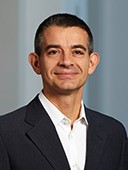
Luca Benini,
Department of Inform.Technol.Electrical Eng.
ETH Zurich, Switzerland
Title Plenty of Room at the Bottom? Micropower Deep Learning for Cognitive Cyberphysical Systems
Abstract
Deep convolutional neural networks are being regarded today as an extremely effective and flexible approach for extracting actionable, high-level information from the wealth of raw data produced by a wide variety of sensory data sources. CNNs are however computationally demanding: today they typically run on GPU-accelerated compute servers or high-end embedded platforms. Industry and academia are racing to bring CNN inference (first) and training (next) within ever tighter power envelopes, while at the same time meeting real-time requirements. Recent results, including our PULP and ORIGAMI chips, demonstrate there is plenty of room at the bottom: pj/OP (GOPS/mW) computational efficiency, needed for deploying CNNs in the mobile/wearable scenario, is within reach.
However, this is not enough: 1000x energy efficiency improvement, within a mW power envelope and with low-cost CMOS processes, is required for deploying CNNs in the most demanding CPS scenarios. The fj/OP milestone will require heterogeneous (3D) integration with ultra-efficient die-to-die communication, mixed-signal pre-processing, event-based approximate computing, while still meeting real-time requirements.
Biography
Luca Benini holds the chair of digital Circuits and systems at ETHZ and Full Professor at the Universita di Bologna.
Dr. Benini's research interests are in energy-efficient system design for embedded and high-performance computing.
He is also active in the area of energy-efficient smart sensors and ultra-low power VLSI design.
He has published more than 800 papers, five books and several book chapters. He is a Fellow of the IEEE and the ACM and a member of the Academia Europaea. He is the recipient of the 2016 IEEE CAS Mac Van Valkenburg award.
Junior Workshop
11th Junior Researcher Workshop on Real-Time Computing
(JRWRTC 2017)
http://www.rtns17.org
The purpose of the 11th Junior Researcher Workshop on Real-Time Computing is to bring together junior researchers working on real-time systems (PhD students, postdocs, etc). The workshop provides a relaxed forum to present and discuss new ideas, new research directions, and to review current trends in the real-time systems area and is based on both short presentations and a poster session to encourage stimulating discussions.
The scope of the JRWRTC 2017 includes (but is not limited to) the following areas:
- Real-time system design and analysis: task and message scheduling, modeling, verification, evaluation, model-driven development, worst-case execution time estimation, distributed systems, fault tolerance, quality of service, security, real-time system benchmarking
- Infrastructure and hardware for real-time systems: wired and wireless communication networks, fieldbuses, networked control systems, sensor networks, power-aware scheduling
- Software technologies for real-time systems: compilers, programming languages, middleware and component-based technologies, operating systems, tools and benchmarks
- Real-time applications: automotive, avionics, telecommunications, process control, multimedia
Best Paper Award in the Junior Workshop: Khaoula Boukir, Jean-Luc Béchennec, and Anne-Marie Déplanche. Reducing the Gap between Theory and Practice: Towards a Proven Implementation of Global EDF in Trampoline
Please consult the website of the 25th International Conference on Real-Time and Network Systems for further information on registration, venue and hotel reservations.
The call for papers is also available as both PDF and plain text. Why JRWRTC ?
Important dates
| Submission deadline: | Sept. 8th, 2017 (extended) |
|---|---|
| Notification of acceptance: | Sept. 18th, 2017 |
| Final manuscript due: | Sept. 22th, 2017 |
| Conference: | Oct. 4-6th, 2017 |
Workshop chair
- Mitra Nasri, Max Planck Institute for Software Systems (MPI-SWS), Germany
- Guillaume Phavorin, Université de Poitiers, France
Program committee
- Matthias Becker (Mälardalen University, Sweden)
- Alessandro Biondi (Scuola Superiore Sant'Anna, Italy)
- Georg von der Bruggen (TU Dortmund, Germany)
- Simin Cai (Mälardalen University, Sweden)
- Dakshina Dasari (Robert Bosch GmbH, Germany)
- Frank DĂĽrr (IPVS, University of Stuttgart, Germany)
- Pontus Ekberg (Uppsala University, Sweden)
- Tomasz Kloda (INRIA, France)
- Jing Li (Washington University in St. Louis, USA)
- Morteza Mohaqeqi (Uppsala University, Sweden)
- Borislav Nikolic (CISTER/ISEP, Portugal)
- Abhilash Thekkilakattil (AtlasCopco Industrial Technique R&D, Sweden)
- Kecheng Yang (University of North Carolina at Chapel Hill, USA)
Paper Submission Guidelines
Submission guidelines: authors can submit up to 4 pages in double column format, with 10pt font (the latex template can be downloaded here).
Every submission should be co-authored by at least one junior researcher. One author of every accepted paper should be registered to the conference to present the paper in a talk and during the poster session.
A booklet containing the proceedings will be available on the web.
Registration
All participants must be registered. Please register in advance.
Registration at Early Registration rates will be
possible until September 20, 2017 (deadline extended).
AT LEAST ONE AUTHOR PER FULL PAPER (student or full rate) has to be
registered before September 20, 2017 (deadline extended).
AT LEAST ONE AUTHOR PER JUNIOR WORKSHOP PAPER (student or full rate)
has to be registered before September 20, 2017 (deadline extended).
Registration form
Registration is only available online: online registration.Registration fees to the main conference:
| |
Early | Late |
| Student | 200€ | 290€ |
| Full Rate | 340€ | 490€ |
| Contributor* | 500€ | 500€ |
The registration fees includes for all packages:
- Lunches and Breaks from October 4 to 6, 2017
- A cocktail on October 4
- A gala dinner on October 5
- Entry to all conference sessions including junior workshop
- Proceedings (electronic: USB)
- Conference bag, containing the official conference material.
In all packages, travel and hotel costs are not included and are the responsibility of each conference participant.
See the form for cancellation policy.
Important dates
| Submission (firm) deadline: | Mon July 17, 2017, 23:59:59 anywhere on Earth |
| Notification to authors: | Fri September 1, 2017 |
| Early registration deadline: | Sun September 10, 2017 |
| Camera ready paper due: | Mon September 25, 2017 |
| Conference: | October 4-6, 2017 |
Conference Committees
General chair- Claire Maiza (Grenoble INP, Verimag, Université Grenoble Alpes, France)
- Catherine Parent-Vigouroux (Université Grenoble Alpes, Verimag, France)
- Pascal Raymond (CNRS, Verimag, Université Grenoble Alpes, France)
Program chairs
- Enrico Bini (University of Turin, Italy)
- Claire Pagetti (ONERA/ENSEEIHT/TUHH, Toulouse, France)
Local organization committee
- Amaury Graillat (PhD student, Verimag, Université Grenoble Alpes, France)
- Rany Kahil (PhD student, Verimag, Université Grenoble Alpes, France)
- Sophie Quinton (INRIA Grenoble RhĂ´ne-Alpes, France)
- Hamza Rihani (PhD student, Verimag, Université Grenoble Alpes, France)
- Valentin Touzeau (PhD student, Verimag, Université Grenoble Alpes, France)
- Hang Yu (PhD student, Verimag, Université Grenoble Alpes, France)
Program committee
- Yasmina Abdeddaïm (Université Paris-Est, LIGM, ESIEE Paris, France)
- Luca Abeni (Scuola Superiore S. Anna, Pisa, Italy)
- Karine Altisen (Univ. Grenoble Alpes, CNRS, Grenoble INP, Verimag, France)
- Sebastian Altmeyer (University of Amsterdam, The Nederlands)
- Amir Aminifar (EPFL, Switzerland)
- James H. Anderson (The University of North Carolina at Chapel Hill, USA)
- Hakan Aydin (George Mason University, USA)
- Patricia Balbastre (Universitat Politècnica de València, Spain)
- Sanjoy Baruah (The University of North Carolina at Chapel Hill, USA)
- Moris Behnam (Mälardalen University, Sweden)
- Florian Brandner (Télécom ParisTech, Université Paris-Saclay, France)
- Hugues Cassé (IRIT - University of Toulouse, France)
- Liliana Cucu-Grosjean (Inria de Paris, France)
- Robert I. Davis (University of York (UK) and Inria, Paris, France)
- Jean-Dominique Decotignie (Swiss Center for Microtechnology, Switzerland)
- Sébastien Faucou (Université de Nantes, France)
- Nathan Fisher (Wayne State University, USA)
- Julien Forget (University of Lille 1, France)
- Sylvain Girbal (Thales, France)
- Joël Goossens (Université libre de Bruxelles, Belgium)
- Emmanuel Grolleau (LIAS, ISAE-ENSMA, France)
- Nan Guan (Hong Kong Polytechnic University)
- Damien Hardy (Université de Rennes, France)
- JĂ©rĂ´me Hugues (ISAE Supaero, Toulouse, France)
- Mathieu Jan (CEA LIST, France)
- Jörn Janneck (Lund University, Sweden)
- Mehdi Kargahi (University of Tehran, Iran)
- Claire Maiza (Grenoble INP / Verimag, France)
- Alejandro Masrur (TU Chemnitz, Germany)
- Geoffrey Nelissen (CISTER, ISEP, Portugal)
- Paulo Pedreiras (Deti/UA/Instituto de Telecomunicacoes, Portugal)
- Selma Saidi (TUHH, Germany)
- Luca Santinelli (ONERA Toulouse, France)
- Jean-Luc Scharbarg (IRIT/ENSEEIHT, France)
- Martin Schoeberl (Technical University of Denmark, Denmark)
- Ye-Qiong Song (University of Lorraine, France)
- Pascal Sotin (IRIT, Toulouse, France)
- Youcheng Sun (University of Oxford, UK)
- Wang Yi (Uppsala University, Sweden)
Steering committee
- Sanjoy Baruah (The University of North Carolina at Chapel Hill, USA)
- Liliana Cucu-Grosjean (INRIA, Paris-Rocquencourt, France)
- Robert I. Davis (University of York, UK)
- Sébastien Faucou (Université de Nantes, France)
- Laurent George (Université Paris Est Creteil, France)
- JoĂ«l Goossens (chair) (Université Libre de Bruxelles (ULB), Belgium)
- Emmanuel Grolleau (LIAS, ISAE-ENSMA, France)
- Isabelle Puaut (IRISA, Université Rennes I, France)
- Jean-Luc Scharbarg (Université de Toulouse, France)
- Julien Forget (Université de Lille, France)
- Mitra Nasri (Max Planck Institute, Germany )
- Guillaume Phavorin (Université de Poitiers, France)
Local information
For any information, you can send an e-mail to the local organization committee
Venue and useful informations
The meeting will take place at Université Grenoble Alpes - Batiment IMAG on October 4-6, 2017.
Access: Tram line B or C, stop Gabriel Fauré.
Wi-Fi network with access control on site (including eduroam).
Lunches and coffee breaks will be served on site. They are included in
the registration fees.
|
Address Batiment IMAG - Université Grenoble Alpes 700 avenue Centrale - 38400 SAINT MARTIN D'HERES Click here for the Openstreetmap or here for the Google map |
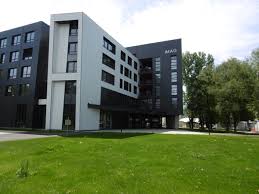
|
Traveling to France may require a visa.
See this page for complete official details.
Contact us for requesting visa support letters, only for authors with accepted papers (conference or junior workshop), or members of the conference committee.
Those requesting a letter should allow at least 15 business days to receive it.
How to reach the location of the conference
By tram
You can take the tram to get the campus. Two tram lines for the campus: line B and line C (more information on http://www.tag.fr).
From the train station, line B, Grenoble Presqu’île / Gières Plaine des Sports, direction Gières Plaine des Sports. Stop « Gabriel Fauré ».
Line C, Seyssins le Prisme / Saint Martin d’Hères Condillac Universités, direction Saint Martin d’Hères Condillac Universités. Stop « Gabriel Fauré ».
Verimag is 4mn walk away from the « Gabriel Fauré station (See the route on Google Maps)
By plane
Three airports, two of which are less than one hour from Grenoble
|
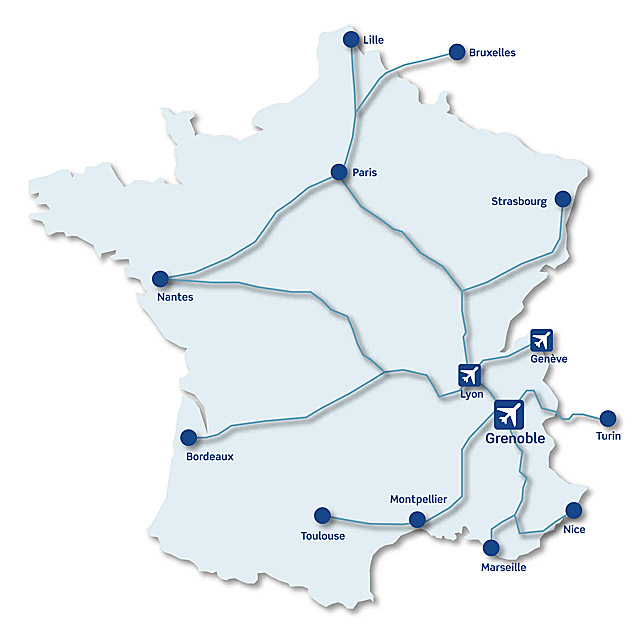
|
By train
The train station is ideally located in the city center
- Grenoble <> Paris: 2h55 with TGV (high speed train), 10 departures per day
- Lyon Part-Dieu’s hub: 1h20 with TER (regional trains)
By car
From Paris / Lyon / north of France: motorway A48
From Valence / Marseille / south of France: motorway A49
From Chambéry / Switzerland (Geneva) and Italy (Turin/Torino): motorway A41
Distances
Lyon: 100 km / Geneva: 150 km / Turin/Torino: 250 km / Marseille: 275 km / Paris: 575 km
Accomodation
Hotels with preferential rates within the limit of available rooms
> 80€
| Hotel | Price for one night | Contact | Booking Code | Public transportation |
|---|---|---|---|---|
| Hotel d'Angleterre | 93€ single room 99€ double room |
+33 (0)4 76 90 63 09, Email | RTNS | Tram line B, stop Victor Hugo |
| Hotel de l'Europe | 90€ single room | +33 (0)4 76 46 16 94, Email | RTNS | Tram line B, stop Maison du Tourisme |
< 80€
| Hotel | Price for one night | Contact | Booking Code | Public transportation |
|---|---|---|---|---|
| Hotel Ibis Grenoble UniversitĂ© | 69€ single room | +33 (0)4 76 44 00 44, Email | Tram line B, stop Mayencin Champ Roman | |
| Hotel des Alpes | 64€ single room 68€ double room 73€ twin room |
+33 (0)4 76 87 00 71, Email | Tram line B, stop Gares | |
| Hotel Suisse et Bordeaux | 65€ single room 80€ double/twin room |
+33 (0)4 76 47 55 87, Email | Conférence RTNS | Tram line B, stop Gares |
| ResidHotel Grenette | 75€ studio single | +33 (0)4 76 94 45 45, Email | UGA/RTNS | Tram line B, stop Victor Hugo |
| ResidHotel Central Gare | 79€ studio single | +33 (0)4 76 50 77 88, Email | UGA/RTNS | Tram line B, stop Gares |
For other accomodation
Visit www.grenoble-tourisme.comTourism
Visit GrenobleThe city, its layout, and its history then become much clearer:
At the center, the historic heart is dense, rich with a prestigious past going back more than 2000 years in history. To the west, a world renowned scientific complex. To the south, the urban sprawl accelerated by the 1968 winter Olympic Games and to the east, the university campus which welcomes 61,000 students.
Naturally Y-shaped thanks to the presence of the three alpine chains, Grenoble can be accessed from three points: one from the direction of Valence and Lyon, the other from the south and the Route Napoléon, and the last from Chambery and Italy.
A remarkable university and scientific population give Grenoble the image of a young, cosmopolitan city, one that is constantly on the move. The arrival and departure of the students and scientists mean that Grenoble never gets caught up with stereotypes. This is a free city!
Just as comfortable with culture as with sports, Grenoble offers a wide variety of activities. On the cultural side, how could we mention Grenoble without talking about the Museum of Grenoble and le Magasin (National Contemporary Art Center), leaders when it comes to art. Not to mention France's first house of culture, inaugurated in 1968 by André Malraux. Today known as the MC2, this cultural center hosts a multitude of music, film, and theatre festivals, as well as areas dedicated to electronic music.
As for sports, Grenoble is just a few minutes from several ski resorts and you can set out on a mountain hike from the city center, via La Bastille. The city also boasts the first urban via ferrata in France.
With its 300 km of flat bike paths, Grenoble is also a cyclist's paradise.
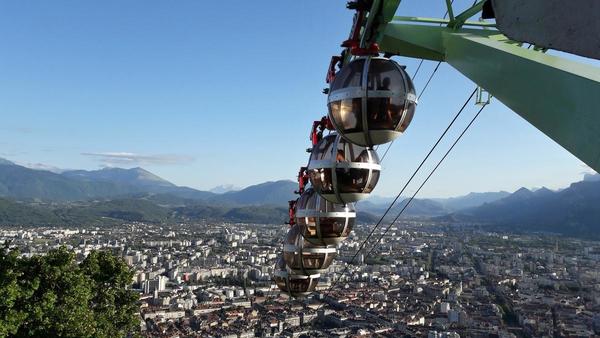
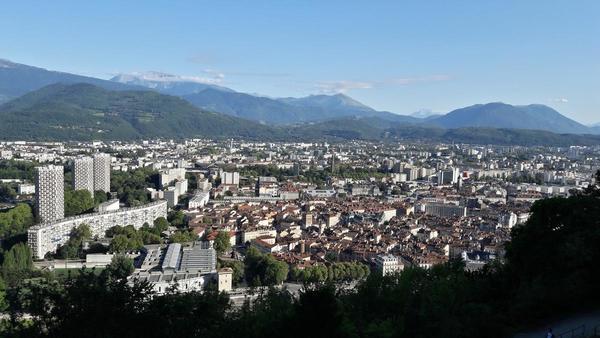
Past Issues
RTNS 2016: Brest (France), PC chairs: Sébastien Faucou (Université de Nantes, FRANCE) and Luis Miguel Pinho (CISTER Research Center, Porto, Portugal)
RTNS 2015: Lille (France), PC chairs: Liliana Cucu-Grosjean (INRIA, Paris-Rocquencourt, FRANCE) and Nathan Fisher (Wayne State University, USA)
RTNS 2014: Versailles (France), PC chairs: Joël Goossens (ULB, Brussels, Belgium) and Claire Maiza (INP/Verimag, Grenoble, France)
RTNS 2013: Sophia Antipolis (France), PC chairs: Rob Davis (University of York, UK) and Emmanuel Grolleau (LIAS, Poitiers, France)
RTNS 2012: Pont Ă Mousson (France), PC chairs: Christine Rochange (University of Toulouse/IRIT, France) and Jim Andersson (University of North Carolina, USA)
RTNS 2011: Nantes (France), PC chairs: Alan Burns (University of York, UK) and Laurent George (Inria/AOSTE - UPEC/LISSI, France)
RTNS 2010: Toulouse (France), PC chairs: Sanjoy Baruah (University of North Carolina, USA) and Yves Sorel (Inria, Rocquencourt, France)
RTNS 2009: Paris (France), PC chairs: Maryline Chetto (IRCCyN, Nantes, France) and Mikael Sjödin (Mälardalen University, Sweden)
RTNS 2008: Rennes (France), PC chairs: Pascale Minet (Inria-Rocquencourt/Hipercom, France) and Giorgio Buttazzo (Scuola Superiore Sant'Anna, Pisa, Italy)
RTNS 2007: Nancy (France), PC chair: Isabelle Puaut (University of Rennes/IRISA, France)
RTNS 2006: Poitiers (France), PC chair: Guy Juanole(LAAS, Toulouse, France) and Pascal Richard (LISI, Poitiers, France)
RTS 2005: Paris (France), PC chair: Nicolas Navet (LORIA, Nancy, France)
RTS 2004 : Paris (France),PC chair : Joël Goossens (University of Bruxelles, Belgium)
RTS 2001: Paris (France), PC chair: Zoubir Mammeri (IRIT, UPS Toulouse, France)
RTS 2000: Paris (France), Francis Cottet (LISI, ENSMA, Poitiers)
RTS03, RTS02, RTS99, RTS98, RTS97, RTS96, RTS95, RTS94, RTS93: no official website
Accepted papers
Leonie Ahrendts, Sophie Quinton and Rolf Ernst. Finite Ready Queues As a Mean for Overload Reduction in Weakly-Hard Real-Time Systems

 artifact
artifact
Hector Joao Rivera Verduzco and Reinder J. Bril. Best-case response times of real-time tasks under fixed-priority scheduling with preemption thresholds
Catherine Nemitz, Tanya Amert and Jim Anderson. Real-Time Multiprocessor Locks with Nesting: Optimizing the Common Case
SĂ©bastien Martinez, Damien Hardy and Isabelle Puaut. Quantifying WCET reduction of parallel applications by introducing slack time to limit resource contention
Florian Greff, Ye-Qiong Song, Laurent Ciarletta and Arnaud Samama. On Combining Source and Destination-Tag Routing to Handle Fault Tolerance in Software-Defined Real-Time Mesh Networks
Andreas Sailer, Michael Deubzer, Gerald Luettgen and Juergen Prof. Dr. Mottok. Comparing Trace Recordings of Automotive Real-time Software
Florian Pölzlbauer, Robert Davis and Iain Bate. Analysis and Optimization of Message Acceptance Filter Configurations for Controller Area Network (CAN)
Alexandre Honorat, Hai Nam Tran, LoĂŻc Besnard, Thierry Gautier, Jean-Pierre Talpin and Adnan Bouakaz. Introducing ADFG: a scheduling synthesis tool for dataflow graphs in real-time systems

 artifact
artifact
Micaiah Chisholm, Namhoon Kim, Stephen Tang, Nathan Otterness, James Anderson, F. Donelson Smith and Donald Porter. Supporting Mode Changes while Providing Hardware Isolation in Mixed-Criticality Multicore Systems
Zhenkai Zhang, Zhishan Guo and Xenofon Koutsoukos. Handling Write Backs in Multi-Level Cache Analysis for WCET Estimation
Nicola Capodieci, Roberto Cavicchioli, Paolo Valente and Marko Bertogna. SiGAMMA: Server based integrated GPU Arbitration Mechanism for Memory Accesses
Sanjoy Baruah. An enhanced scheduler for MC2
Sanjoy Baruah, Vincenzo Bonifaci, Alberto Marchetti-Spaccamela and Victor Verdugo. A scheduling model inspired by control theory
Georg von der BrĂĽggen, Niklas Ueter, Jian-Jia Chen and Matthias Freier. Parametric Utilization Bounds for Implicit-Deadline Periodic Tasks in Automotive Systems
Manohar Vanga, Andrea Bastoni, Henrik Theiling and Björn B. Brandenburg. Supporting Low-Latency, Low-Criticality Tasks in a Certified Mixed-Criticality OS
David Griffin, Benjamin Lesage, Iain Bate, Frank Soboczenski and Robert Davis. Forecast-Based Interference: Modelling Multicore Interference from Observable Factors
Dorin Maxim, Robert Davis, Liliana Cucu-Grosjean and Arvind Easwaran. Probabilistic Analysis for Mixed Criticality Systems using Fixed Priority Preemptive Scheduling
Mauro Leoncini, Manuela Montangero and Paolo Valente. A Branch-and-Bound Algorithm to Compute a Tighter Bound to Tardiness for Preemptive Global EDF Scheduler
Behnaz Pourmohseni, Stefan Wildermann, Michael GlaĂź and JĂĽrgen Teich. Predictable Run-Time Mapping Reconfiguration for Real-Time Applications on Many-Core Systems
Tobias Sehnke, Dieter Schwarzmann, Matthias Schultalbers and Rolf Ernst. Temporal Properties in Automotive Control Software
Houssam Eddine Zahaf, Giuseppe Lipari and Luca Abeni. Migrate when necessary: toward partitioned reclaiming for soft real-time tasks
 artifact
artifact
Guillaume Brau, Nicolas Navet and JĂ©rĂ´me Hugues. Heterogeneous models and analyses in the design of real-time embedded systems - an avionic case study
Mahmoud Shirazi, Mehdi Kargahi and Lothar Thiele. Resilient Scheduling of Energy-Variable Weakly-Hard Real-Time Systems
Dorin Maxim and Ye-Qiong Song. Delay Analysis of AVB trafic in Time-Sensitive Networks (TSN)
 artifact
artifact
Voica Gavrilut, Bahram Zarrin, Paul Pop and Soheil Samii. Fault-Tolerant Topology and Routing Synthesis for IEEE Time-Sensitive Networking 

Daniel Casini, Luca Abeni, Alessandro Biondi, Tommaso Cucinotta and Giorgio Buttazzo. Constant Bandwidth Servers with Constrained Deadlines

 artifact
artifact
Anh Toan Bui Long, Yassine Ouhammou, Emmanuel Grolleau, LoĂŻc Fejoz and Laurent Rioux. Bridging the gap between practical cases and temporal performance analysis: a models repository-based approach
Georg von der BrĂĽggen, Jian-Jia Chen, Wen-Hung Kevin Huang and Maolin Yang. Release Enforcement in Resource-Oriented Partitioned Scheduling for Multiprocessor Systems
José Fonseca, Geoffrey Nelissen and Vincent Nélis. Improved Response Time Analysis of Sporadic DAG Tasks for Global FP Scheduling
Eike Schweissguth, Peter Danielis, Dirk Timmermann, Helge Parzyjegla and Gero Muehl. ILP-based Joint Routing and Scheduling for Time-Triggered Networks
This site is protected by french and international copyright laws. All
rights are reserved, including downloadable documents and the
iconographic and photographic representations.
The reproduction of the texts of this site on a paper support is
authorized under respect for the following two conditions:
- free access of the broadcasting,
- respect for the integrity of the reproduced documents (no modification)
Publisher:
Université Grenoble Alpes
Contact: rtns17@univ-grenoble-alpes.fr
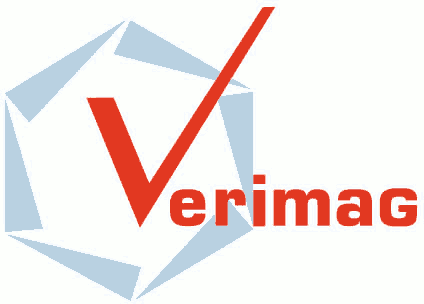

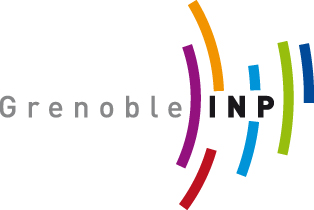


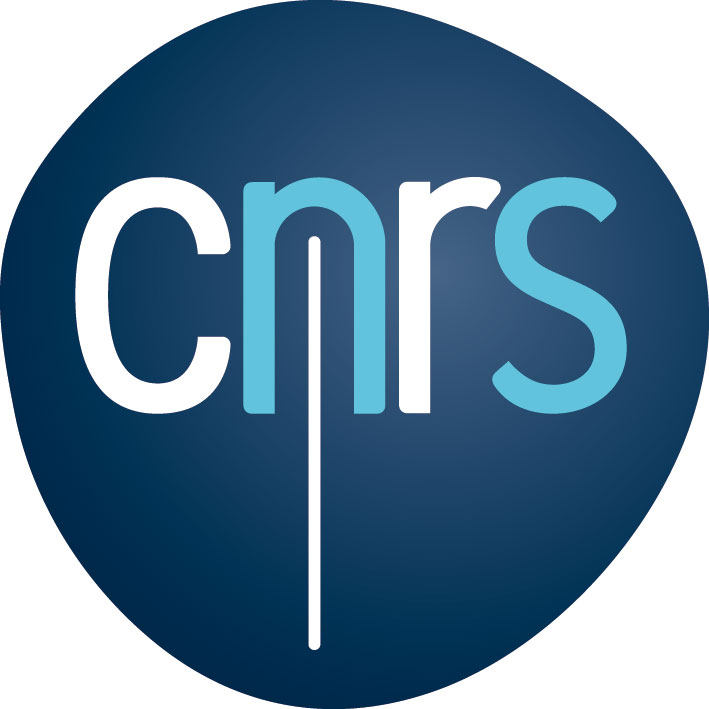
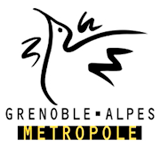
Social events
Wednesday Cocktail
The 4th of October, a cocktail will be organized at the conference location.Chez le Per'Gras Dinner
The 5th of October, the traditional RTNS dinner will be organized at «Chez le Per'Gras», after an historial visit of Grenoble ancient city and a climb with a cable car.
17:00
Guided visit (in english).A walk through the city centre feels more like a trip through time than a simple touristic stroll. From the birth of the city and the Dauphiné region to the dawn of the French Revolution, from the time of Stendhal’s childhood to the time when the Bastille cable car was built, Grenoble will share (almost) all of its secrets with curious visitors!
The meeting point is set to the Office du tourisme (Grenoble tourist office, red cross on the map) at 17:00.
Click to enlarge map.
See on Google Maps
The nearest tram station is Hubert Dubedout Maison du Tourism (green cross on the map).
18:30
After the visit at 18:30, the meeting point for the cable car is at Téléphérique Grenoble-Bastille (Blue cross on the map).
19:30 - 22:30
A drink and the diner will take place in the "Chez le Per'Gras" restaurant.
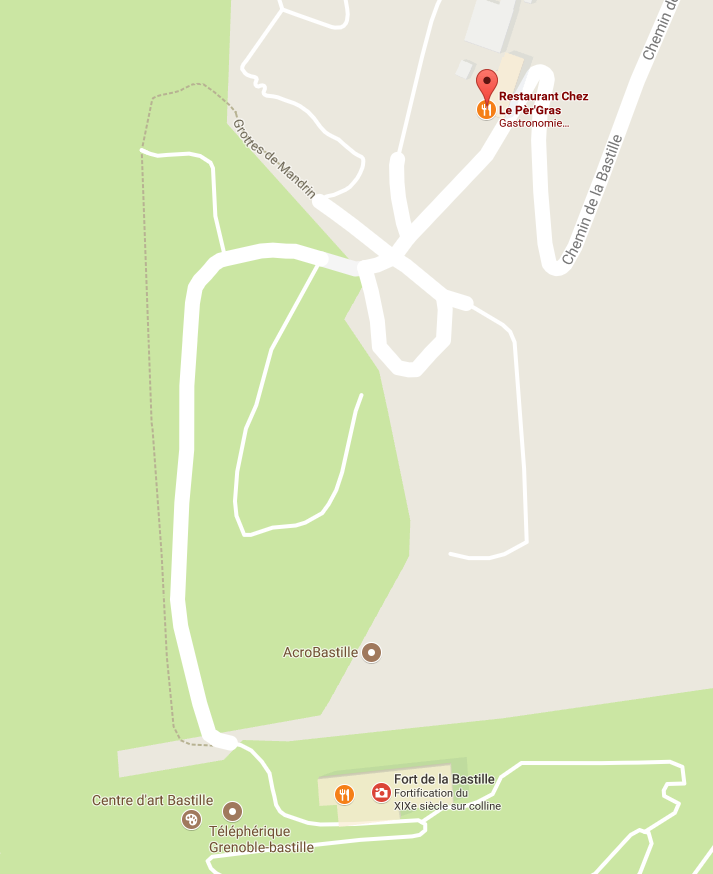
Click to enlarge map.